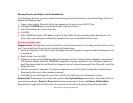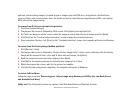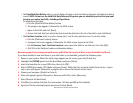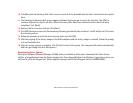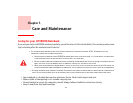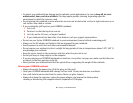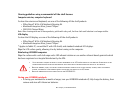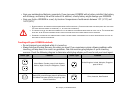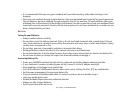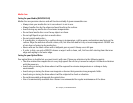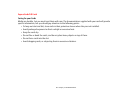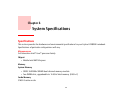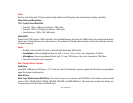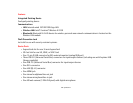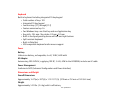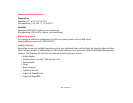
91
- Caring for your LIFEBOOK Notebook
• It is recommended that you carry your notebook with you while traveling, rather than checking it in as
baggage.
• Never put your notebook through a metal detector. Have your notebook hand-inspected by security personnel.
You can however, put your notebook through a properly tuned X-ray machine. To avoid problems, place your
notebook close to the entrance of the machine and remove it as soon as possible or have your notebook hand-
inspected by security personnel. Security officials may require you to turn your notebook on, so make sure you
have a charged battery on hand.
Batteries
Caring for your Batteries
• Always handle batteries carefully.
• Do not short-circuit the battery terminals (that is, do not touch both terminals with a metal object). Do not
carry loose batteries in a pocket or purse where they may mix with coins, keys, or other metal objects. Doing
so may cause an explosion or fire.
• Do not drop, puncture, disassemble, mutilate or incinerate the battery.
• Recharge batteries only as described in this manual and only in ventilated areas.
• Do not leave batteries in hot locations for more than a day or two; intense heat can shorten the battery life.
• Do not leave a battery in storage for longer than 6 months without recharging it.
Increasing Battery Life
• Power your LIFEBOOK notebook through the AC or optional auto/airline adapter whenever possible.
• If your notebook is running on battery power all day, connect it to the AC adapter overnight.
• Keep brightness to the lowest level comfortable.
• Turn off the Wireless LAN/Bluetooth devices when not in use by clicking the [Fn]+[F5] key combination.
• Set the power management for maximum battery life.
• Put your notebook in Standby mode when it is turned on and you are not actually using it.
• Limit your media drive access.
• Disable the Media Player auto insert notification function.
• Always use fully charged batteries.
• Eject ExpressCards when not in use.



